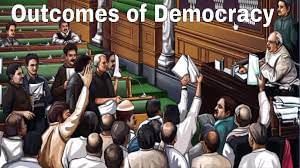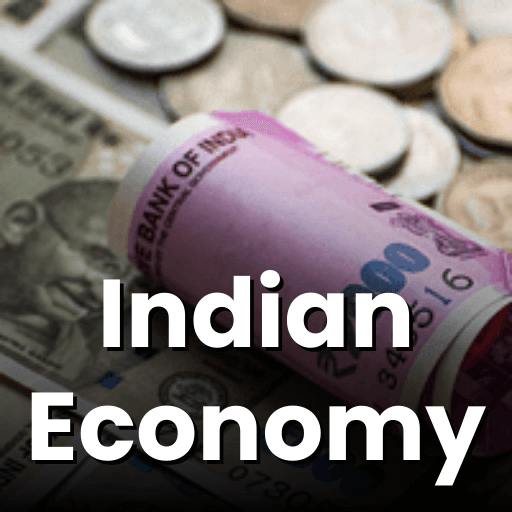NCERT Solutions for Class 10 Civics Chapter 5 - Outcomes of Democracy

Q1. How does democracy produce an accountable, responsive, and legitimate government?
Ans: In a democracy, people choose their leaders and help make decisions that affect everyone. The government must answer to the citizens and meet their needs. Democracy involves discussion and compromise, which can cause delays but ensures decisions follow rules and are transparent. It also sets up ways for people to hold the government accountable. Key practices include regular, fair elections, public debates on important issues, and citizens’ right to know about the government. While democracies should be attentive to people’s needs and avoid corruption, they don’t always meet these expectations. Despite being sometimes slow or inefficient, democratic government is legitimate because it is chosen by the people.
Q2. What are the conditions under which democracies accommodate social diversities?
Ans: Democracies respect differences and evolve mechanisms to negotiate the differences, as was done in Belgium. Democracy is best suited to accommodate social diversities but the example of Sri Lanka reminds us that this democracy must fulfil the following two conditions:
1. The majority always needs to work with the minority so that governments function to represent the general view.
2. Rule by the majority should not become rule by the majority community in terms of religion, race, or linguistic group. Democracy remains democracy only as long as every citizen has a chance of being in the majority at some point in time.
Q3. Give arguments to support or oppose the following assertions:
(a) Industrialised countries can afford democracy but the poor need dictatorship to become rich.
(b) Democracy can’t reduce inequality of incomes between different citizens.
(c) The government in poor countries should spend less on poverty reduction, health, and education and spend more on industries and infrastructure.
(d) In democracy all citizens have one vote, which means that there is an absence of any domination and conflict.
Ans:
(a) History reveals that poor countries achieved better economic growth under a dictatorship rather than in a democracy. Though this may be true, the positive aspects of democracy, like freedom of expression, dignity, and independence cannot be sacrificed for economic growth alone.
(b) To reduce economic inequality, we need to create more jobs, especially in manufacturing and services. This requires improving access to health and education so everyone can contribute to the economy. Additionally, redistributing income from the rich to the poor through fair taxation and targeted subsidies is essential. While democracy plays a role in addressing these issues, it alone cannot achieve economic equality.
(c) This option is not wise. Poverty reduction would allow the poor better access to civic amenities such as health services thereby improving their standard of living. By spending on quality education, informed and productive citizens will emerge and add to the development of the country. A healthy and educated citizen will allow the effective functioning of industries and infrastructure.
(d) The statement is partially true. One vote ensures only equal political opportunity to elect. Democracy is mean and it depends upon the people to have the desired end. Democracy ensures the means of resolution of conflict but not its absence; similarly, it ensures means of political accommodation but not political freedom.
Q4. Identify the challenges to democracy in the following descriptions. Also, suggest policy/institutional mechanism to deepen democracy in the given situations:
(a) Following a High Court directive a temple in Orissa that had separate entry doors for Dalits and non-Dalits allowed entry for all from the same door.
(b) A large number of farmers are committing suicide in different states of India.
(c) Following allegation of killing of three civilians in Gandwara in a fake encounter by Jammu and Kashmir police, an inquiry has been ordered.
Ans:
(a) (i) The challenge relates to social diversity. There are separate doors for Dalits and Non-Dalits to enter the temple.
(ii) To deepen democracy, there should be a law banning discrimination on account of caste, religion or other factors. People should also be encouraged to come forward and support abolishing this practice.
(b) This relates to economic inequalities with special reference to the poor condition of farmers in different states of India. The government should take the following steps to improve their condition:
(i) To give financial help or loans for the purchase of seeds, urea, etc.
(ii) Irrigation and other facilities should be increased to avoid the situation of droughts.
(iii) The MSP of crops should be increased.
(c) (i) The dignity and freedom of citizens have been challenged.
(ii) There should be transparency in the working of the police departments to avoid fake encounters. Only then there will be trust of the people in the government’s activities and democracy will be deepened.
Q5. In the context of democracies, which of the following ideas is correct - democracies have successfully eliminated?
(a) conflicts among people
(b) economic inequalities among people
(c) differences of opinion about how marginalised sections are to be treated
(d) the idea of political inequality
Ans: d) the idea of political inequality
Democracies aim to reduce political inequality by ensuring that all citizens have equal rights to participate in the political process, such as voting and running for office. However, they have not completely eliminated conflicts, economic inequalities, or differences in opinions about how marginalized sections should be treated.
Q6. In the context of assessing democracy which among the following is odd one out. Democracies need to ensure:
(a) free and fair elections
(b) dignity of the individual
(c) majority rule
(d) equal treatment before the law
Ans: c) majority rule
While free and fair elections, dignity of the individual, and equal treatment before the law are essential components for evaluating the health of a democracy, majority rule alone does not guarantee a functioning democracy. Democracy requires not only that decisions be made by majority rule but also that minority rights are protected, and all individuals are treated with dignity and equality.
Q7. Studies on political and social inequalities in democracy show that
(a) democracy and development go together
(b) inequalities exist in democracies
(c) inequalities do not exist under dictatorship
(d) dictatorship is better than democracy
Ans: b) inequalities exist in democracies
Studies on political and social inequalities reveal that while democracies aim to promote equality and justice, inequalities can still persist within democratic systems. This is due to various factors such as economic disparities, social stratification, and unequal access to opportunities.
Q8. Read the passage below:
Nannu is a daily wage earner. He lives in Welcome Mazdoor Colony, a slum habitation in East Delhi. He lost his ration card and applied for a duplicate one in January 2004. He made several rounds to the local Food and Civil Supplies office for the next three months. But the clerks and officials would not even look at him, leave alone do his job or bother to tell him the status of his application. Ultimately, he filed an application under the Right to Information Act asking for the daily progress made on his application, names of the officials, who were supposed to act on his application, and what action would be taken against these officials for their inaction.
Within a week of filing an application under the Right to Information Act, he was visited by an inspector from the Food Department, who informed him that the card had been made and he could collect it from the office. When Nannu went to collect his card next day, he was given a very warm treatment by the Food and Supply Officer (FSO), who is the head of a Circle. The FSO offered him tea and requested him to withdraw his application under the Right to Information since his work had already been done.
What does Nannu’s example show? What impact did Nannu’s action have on officials? Ask your parents their experiences when they approach government officials to attend to their problems.
Ans: (a) Nannu’s example shows that ordinary people should be aware of their rights. They should exercise their rights without any fear as has been done by Nannu.
(b) Nannu’s action had a significant effect on the officials who not only made his ration card but also offered him a cup of tea at the office of the Food and Supply Officer. He was given proper respect. However, the Food and Supply Officer requested him to withdraw his application because his ration card had been prepared.
(c) The experiences of the parents are not satisfactory. Generally the govt, officials do not bother about the people who visit them. Their problems are not solved. They are asked to come again and again. However, now there is some improvement due to Right to Information.
|
65 videos|517 docs|79 tests
|
FAQs on NCERT Solutions for Class 10 Civics Chapter 5 - Outcomes of Democracy
| 1. What are the key outcomes of democracy discussed in Class 10 NCERT Solutions? |  |
| 2. How does democracy improve the quality of decision-making? |  |
| 3. Why is accountability an important outcome of democracy? |  |
| 4. In what ways does democracy contribute to social justice? |  |
| 5. How does the participation of citizens affect the outcomes of democracy? |  |




























